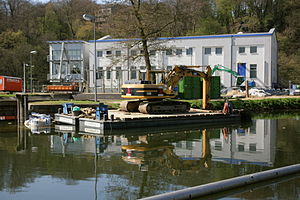Stiepel waterworks
| Stiepel waterworks | ||
|---|---|---|
| location | ||
|
|
||
| Coordinates | 51 ° 24 '46 " N , 7 ° 13' 16" E | |
| country |
Germany North Rhine-Westphalia |
|
| place | Bochum | |
| Waters | Dysentery | |
| power plant | ||
| owner | Water procurement Mittlere Ruhr GmbH | |
| operator | Stadtwerke Bochum | |
| construction time | 1910 | |
| Start of operation | 1996 (renovation) | |
| technology | ||
| Bottleneck performance | 0.4 megawatts | |
| Average height of fall |
4 m | |
| Expansion flow | 55.5 m³ / s | |
| Standard work capacity | 0.370 million kWh / year | |
| Turbines | 6 Kaplan turbines | |
| Generators | 2 | |
| Others | ||
The Stiepel waterworks (more precisely: the Stiepel turbine pump and hydropower plant ) is the second run-of-river power plant in Bochum on (or in) the Ruhr , alongside the hydroelectric power plant in the weir of the Kemnader See . To this day, it is primarily used to produce drinking water.
history
The power plant was built in 1910 as a pumping station for water procurement next to the Blankenstein lock . It was extensively modernized in 1996.
Energy generation
Two of the six Kaplan turbines in the power plant are equipped with generators, which together have an electrical output of 400 kW. The other four turbines are directly coupled to pumps that pump the drinking water obtained into the 110 m high reservoir in Stiepel . Of the almost 1 GWh of energy produced annually, around 370 MWh are fed into the medium-voltage level of the network. The rest of the energy is used for personal use .
Drinking water production
The drinking water on the Ruhr is obtained from several rows of wells and vertically laid drainage pipes, with both groundwater and bank filtrate being pumped. The previously operated and still existing infiltration basins have been closed. The water is cleaned of suspended matter in a multi-layer filter system, subjected to deacidification and chlorination before it is pumped to the Bochum-Stiepel water room , an elevated tank . With 46,000 m³ of drinking water per day, the system covers more than half of Bochum's demand.
Stadtwerke Bochum has announced that it will give up drinking water production in the Stiepeler waterworks in 2014/15, as supply to the North Rhine-Westphalian Ministry of the Environment will then require four filter stages. In the Stiepel waterworks, however, only two stages are used; € - a pipe from the Witten waterworks , which already has four filter stages, to the elevated tank in Stiepel would cost less than half.
The operator of the waterworks is the water procurement Mittlere Ruhr GmbH, a joint venture of Gelsenwasser and the Stadtwerke Bochum . Gelsenwasser is responsible for the technical management . The Bochumer Stadtwerke offer company tours for school classes in the waterworks. The nearby water educational trail on the Ruhr shows information about water extraction as well as the waterworks and the nearby lock. To protect the water production was water reserve "Sundern-Stiepel" created.
literature
- With new energy into the future - innovative energy projects in the central Ruhr area. (PDF; 915 kB) Stadtwerke Herne, accessed on November 4, 2011 .
Web links
- Stadtwerke Bochum: 1910 - The Stiepel turbine works goes into operation and water in Bochum - Stiepel water works
- Bochumschau with a film on water production and the Stiepel waterworks
- Description of all locations on this themed route as part of the Route of Industrial Culture
Individual evidence
- ↑ Benedikt Reichel: "New regulation Bochum water should come from Witten in the future" in: Ruhrnachrichten from January 18, 2013 online (accessed on January 27, 2013)
- ↑ Gelsenwasser: Stiepel waterworks




